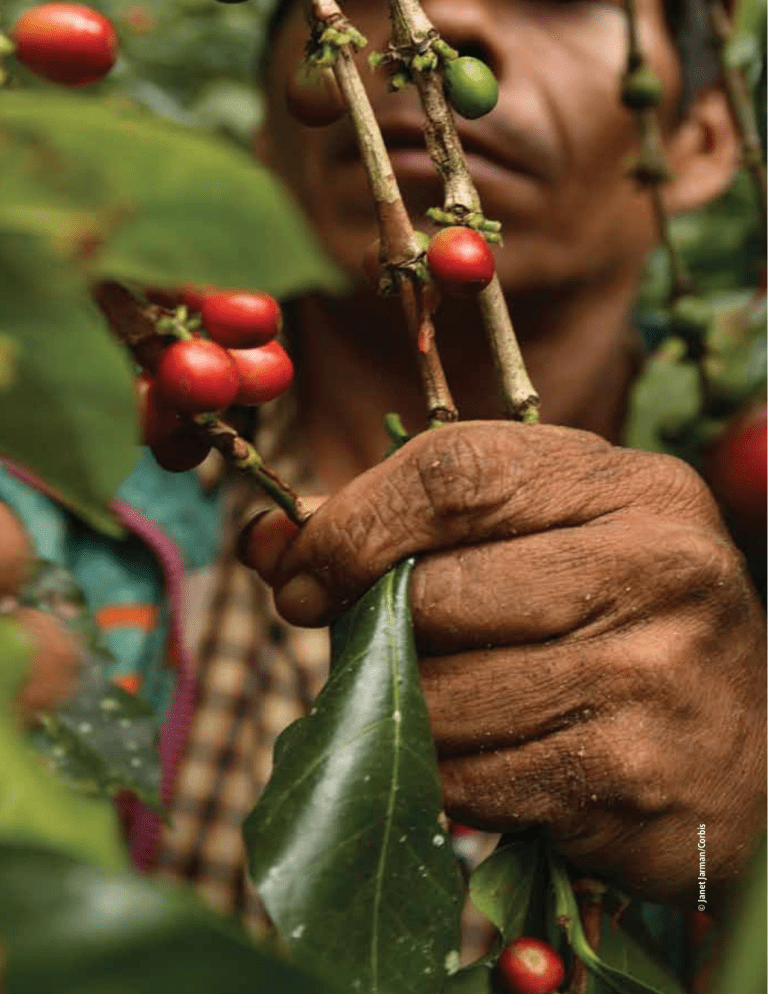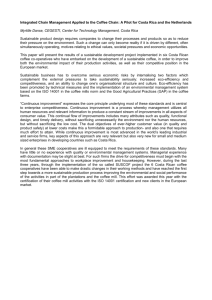30 © Janet Jarman/Corbis

30
eco-certification in Developing countries
Truth in
Advertising?
Allen Blackman documents the surprising lack of hard evidence that eco-certification benefits the environment and describes some of the first rigorous studies showing that it can.
Over the past two decades, nongovernmental organizations, private companies, and goverments have launched so many eco-certification initiatives targeting developing-country firms and farms that it is now possible to feed, clothe, and house a family solely with goods from these countries certified as sustainably produced.
The trend is particularly prominent in highvalue agriculture. Today, 15 percent of the bananas, 10 percent of the timber, and 7 percent of the coffee sold on world markets are certified by organizations like the Rainforest Alliance, the International Federation of Organic Agriculture Movements, and the
Forest Stewardship Council.
But does eco-certification really improve the environment in developing countries?
My recent research, conducted in collaboration with Environment for Development
(EfD) partners, suggests that the short answer is, unfortunately, we do not yet know. Two new field studies we conducted on coffee farms in Costa Rica and Colombia
31
offer some of the first hard evidence that eco-certification can spur greener production, but overall, we do not yet have nearly enough rigorous, credible evidence to understand whether and in what cases that generally holds true.
Eco-certification’s Environmental
Benefits
According to advocates, eco-certification spurs producers to adopt greener practices.
They argue that the causal chain works like this: Eco-certification enables consumers who prefer green goods to identify and purchase them. Elevated demand for such goods generates price premiums and better market access for green producers, which, in turn, creates financial incentives for them to hew to sustainable production practices.
More important, it encourages relatively dirty producers to adopt such practices so that they can become eco-certified.
If that argument holds, eco-certification could be an important tool for addressing environmental problems in developing countries. Growing and processing bananas, timber, coffee, cocoa, and other agricultural products in poor countries causes deforestation, soil erosion, and agrochemical pollution—all of which have grave effects on ecosystems and human health. These problems are extremely hard to tackle using conventional top-down government regulation because producers are often small, numerous, and geographically dispersed.
Meanwhile, regulatory institutions are undermanned and underfunded. Ecocertification schemes have the potential to sidestep these constraints by creating a private-sector system of economic incentives, monitoring, and enforcement.
But not every eco-certification program will have these desirable effects. To do that, a program must set and enforce standards stringent enough to ensure exclusion of dirty producers. It also must offer price premiums high enough to offset the costs producers pay to meet certification standards and deal with the red tape involved in getting certified. Even if these two conditions are met, program benefits still can be undermined by so-called selection effects.
Producers already meeting certification standards have strong incentives to select into eco-certification: they do not need to invest in adopting sustainable practices to pass muster and can obtain price premiums and other benefits. But programs that mainly attract already-green producers will not change producer behavior and will have limited environmental benefits.
What Do We Know?
Given that millions of dollars go to promoting eco-certification each year, we need to know whether and under what circumstances environmental benefits are realized—and we need to know quickly.
But arriving at credible answers requires rigorous empirical research that controls for a number of factors that make evaluating eco-certification programs challenging.
These include the selection effects noted above and the fact that a wide variety of intertwined factors affect producers’ environmental performance.
A multilateral nongovernmental organization devoted to protecting the global environment, the Global Environment
Facility (GEF), is the world’s largest funder of environmental projects, including eco- certification initiatives in developing countries. In 2009, to help improve the effectiveness of its grantmaking, the GEF hired RFF to review and summarize the existing evidence on the environmental and socioeconomic benefits of eco-certification, focusing on five sectors where it is particularly prominent: bananas, coffee, fish products, forest products, and tourism. Based on
32
joint work with Jorge Rivera, an EfD partner, our findings confirmed that few studies have tried to measure the producer-level environmental effects of eco-certification, and even fewer have overcome the associated methodological challenges.
We found just 46 relevant studies, which focused on a small subset of certified commodities (coffee and timber) and certification programs (Fairtrade International and the Forest Stewardship Council). Only
11 studies used methods likely to produce unbiased results—and of these, just 2 focused on the environmental effects.
Neither found a significant benefit.
Organic Coffee in Costa Rica and
Colombia
To help fill this knowledge gap, RFF and its
EfD partners have undertaken two studies of organic coffee certification in Latin
America. One study, a joint effort with Maria
Angelica Naranjo of the EfD Center for
Central America, focuses on coffee growers in Turrialba, Costa Rica, in the central part of the country. A second examines growers in
Cauca, Colombia, in the southeastern part of the country. This project is in collaboration with Marcela Ibañez, a professor in
Germany.
Coffee growing in Costa Rica and Colombia causes serious environmental damage.
Traditionally, coffee in all of Latin America was grown alongside shade trees without agrochemicals. But since the 1970s, more than two-thirds of coffee acreage in both countries has been converted to a highyielding monocrop system in which coffee is grown with minimal shade cover and copious synthetic fertilizers, pesticides, and herbicides.
This switch to so-called “technified” coffee has accelerated soil erosion—a big problem on coffee farms because they are mostly located on steep mountainsides— and has contributed to biodiversity loss and the contamination and sedimentation of surface and groundwater. Also, processing of coffee, regardless of how it is grown, is a notorious source of water pollution.
33
According to advocates, organic certification can help reverse these problems. It requires coffee growers to adopt sustainable practices, including using organic materials and natural methods instead of agrochemicals to maintain soil quality and control disease, pests, and weeds; using soil conservation practices, such as contour planting, terracing, and planting shade trees; avoiding fossil fuels; and minimizing pollution during processing.
Several large international organic certifying bodies, such as International Federation of Organic Agriculture Movements, formulate basic organic standards for coffee and various other commodities. These large organizations accredit smaller national ones that, in turn, certify growers and monitor them at least once a year to ensure they meet organic standards.
For growers, organic certification has benefits and costs. It usually provides a price premium of 10 to 20 percent, depending on coffee quality, and it may improve access to markets, inputs, and technical assistance. But certification typically requires more labor and produces lower yields for growers who formerly depended on chemical inputs. In addition, cutting through the red tape associated with certification and monitoring can easily cost 5 percent of sales.
Did Organic Certification Change
Behavior?
The aim of our research in Costa Rica and
Colombia was to determine whether organic certification causes relatively dirty growers to switch to more environmentally friendly practices or mainly attracts already-green producers. If the latter, certification has only limited effects on producer behavior.
At face value, the risk of self-selection in our study areas was substantial. In both areas, the proportion of growers meeting most organic standards before organic certification was introduced was significant—well over half in Cauca. In most cases, these already-green growers were small traditional producers lacking the wherewithal to technify their farms.
To control for self-selection effects, we used a strategy called matching. For each organic certified grower in our sample, we used statistical techniques to identify an uncertified grower with very similar characteristics that affect environmental performance, including education, farm size, and coffee variety. We measured the benefits of organic certification by comparing the average environmental performance of the subsample of certified growers with that of the matched uncertified growers.
Using this approach, we found that in both countries, organic certification did cause growers to abandon most of the dirty practices we considered and to adopt at least some of the green ones. In Costa Rica, we found that organic certification reduced use of all three of the dirty practices we considered (chemical fertilizers, pesticides,
34
and herbicides) and increased adoption of one of four green practices (organic fertilizer). In Colombia, we found that certification reduced use of two of three dirty practices
(chemical fertilizers and pesticides) and increased adoption of one of two green practices (organic fertilizer).
Policy Implications
By our count, our studies in Costa Rica and Colombia have doubled the total number of evaluations of eco-certification benefits that use rigorous quantitative methods. These studies give some grounds for cautious optimism, at least for organic certification. But four rigorous studies are still far too few to draw general conclusions or distill policy prescriptions.
That said, our results hint at two hypotheses that merit further exploration:
» The effectiveness of organic certification may stem from its design characteristics—specifically its reliance on well-defined, stringent standards enforced by independent third-party monitors. Many certification schemes lack these features.
» Initiatives with these characteristics evidently can boost environmental performance even in areas like Cauca, Colombia, where self-selection of already-green producers threatens to dilute or even undermine environmental benefits.
A cautionary note is that initiatives with such features almost certainly impose relatively high costs on certified producers. Absent substantial price premiums or other benefits, these costs will discourage participation.
The Way Forward
Developing countries face both pressing environmental problems and big constraints on their ability to tackle them with conventional top-down regulatory tools. Eco- certification advertises itself as a partial solution to this quandary. To gauge the validity of that advertising, we need much more hard evidence on eco-certification’s environmental impacts. This message has not been lost on governments, foundations, and international cooperation agencies, which are increasingly demanding rigorous, objective impact evaluations. Nor has it been lost on consumers, who are turning to third parties to sort through the bewildering thicket of eco-certification’s criteria and claims. Hopefully, these trends will generate the research needed to measure the level of truth in eco-certification advertising and guide purchasing and policy. fuRtheR ReADiNG
Blackman, Allen, and Maria Angelica Naranjo. 2010. Does Ecocertification Have Environmental Benefits? Organic Coffee in Costa Rica. Discussion paper 10-58. Washington, DC:
Resources for the Future.
Blackman, Allen, and Jorge Rivera. 2011. Producer-Level
Benefits of Sustainability Certification. Conservation Biology
25(6): 1176–85.
Ibañez, Marcela, and Allen Blackman. Does Eco-certification
Have Environmental Benefits? Organic Coffee in Colombia.
Unpublished working paper. Washington, DC: Resources for the Future.
35



